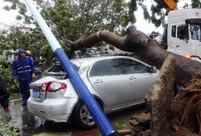The Asian Development Bank (ADB) and the Bangladeshi government Thursday signed a loan agreement totaling 90 million U.S. dollars to overhaul secondary education and to build foundation for developing a skilled labor force.
The assistance is the first tranche of the 500-million-U.S.- dollar Secondary Education Sector Investment Program (SESIP) approved by ADB in September this year, according to a statement of the Manila-based lender.
Md Abul Kalam Azad, secretary of Bangladesh's Economic Relations Division (ERD) and M Teresa Kho, country director for ADB's Bangladesh Resident Mission, signed the loan agreement on behalf of their respective sides.
"Skills shortage is a key challenge Bangladesh is facing to graduate to the next orbit of development," said Teresa Kho.
He noted that Bangladesh has great potentials for rapid development if it can improve skills of the huge working-age population in the next decade.
The 90-million-U.S.-dollar ADB assistance under the first tranche of the SESIP will help make teaching and learning more market related, it said, adding that teaching equipment, laboratories, tools and teacher training will be provided to improve courses like science, mathematics and English teaching.
The SESIP, scheduled to be completed in 2023, will support the Bangladeshi government's 10-year secondary education reform plan. This plan expects an increase of about 3.5 million students and requires an additional 145,000 teachers and 10,000 more schools by 2023, according to the statement.
About 2 million youths are now entering the Bangladesh job market annually but nearly 90 percent of them end up in poorly- paid informal work that requires few skills, according to the ADB.
The low skills base of the workforce is undermining productivity and weighing on attempts to diversify the economy, the statement said.
While Bangladesh has made great efforts in improving enrolment rate, secondary schools still suffer from outdated courses and teaching materials, a lack of common school standards, poor teaching and weak management, it added.
 Luxury-cars parade held in Dubai
Luxury-cars parade held in Dubai Special forces take tough training sessions
Special forces take tough training sessions Fire guts 22-storey Nigeria commercial building in Lagos
Fire guts 22-storey Nigeria commercial building in Lagos Singles Day:
Singles Day:  Temperature drops dramatically in Beijing
Temperature drops dramatically in Beijing Typhoon Haiyan hits south China's Hainan
Typhoon Haiyan hits south China's Hainan Top 10 celebrity moms in China
Top 10 celebrity moms in China Weekly Sports Photos:
Weekly Sports Photos: Gingko leaves turn brilliant golden yellow in Beijing
Gingko leaves turn brilliant golden yellow in Beijing Maritime counter-terrorism drill
Maritime counter-terrorism drill Love searching stories in cities
Love searching stories in cities Male belly dancer in women’s fitness club
Male belly dancer in women’s fitness club  15 best rivers for travelers in world
15 best rivers for travelers in world National Geographic Traveler Photo Contest
National Geographic Traveler Photo Contest Weekly Sports Photos
Weekly Sports PhotosDay|Week|Month